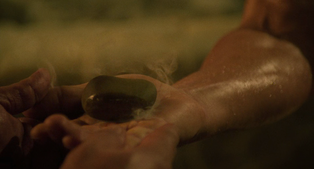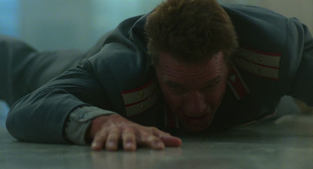
Sketch comedy can be traced all the way back to vaudeville. To begin with a lame phrase: “Back in the day,” audiences had a limited amount of entertainment options. It’s certainly ironic that while musicals like Oklahoma!, My Fair Lady, and later Les Misérables would run close to 3 hours, theatrical sketches could last no more than 5 minutes before moving on to the next act. Several members of the current generation can’t be bothered to watch a 3-minute YouTube video, but throw on a svelte 2-minute comedy sketch, you’re guaranteed at least a few million views. It’s widely agreed upon that sketch comedy was honed and sharpened by the skilled wit of the British. Since then, shows like Monty Python’s Flying Circus (the ‘mostly’ agreed-upon gold standard), SNL, SCTV, Key and Peele, and even the wildly experimental Tim and Eric’s Awesome Show, Great Job! have continued the tradition of blustery hoopla and farcical lunacy. A few of these shows cross-pollinate here and there, but with so many different comic voices and sensibilities, it’s unfair to compare and contrast. Still, if I must, I must, so I’ll go on record as saying my two favorite sketch comedies of all time, Mr. Show and The Kids in the Hall, are the heirs apparent to Monty Python; respectively as the American and Canadian versions of the groundbreaking British comedy series. To be very clear, Mr. Show and KITH do their own thing and they do it incredibly well, but it’s important to honor the past.

I was fortunate enough to see David Cross perform at the Carolina Theatre in early 2016. As a sketch performer, particularly in his collaborations with Bob Odenkirk on Mr. Show, I think he’s a genius. As a stand-up comic...he’s funny. That’s the best I can muster. I’ve listened to several of his albums, and they’re always guaranteed to make me laugh “ya palsy motherfucker!”, but I can’t say he’s my favorite stand-up comic of all time. He is, however, nothing if not willing to tell the truth. The show was delayed nearly 20 minutes as patrons of the theatre slowly shuffled in. My wife and I (or is it me?) arrived well before showtime, even seeing Cross walking back to the theatre after eating dinner at a local restaurant. When Cross finally took the stage, he wasn’t defensive at all, but he addressed the elephant in the room. He lightly mocked and ridiculed those who had arrived late to the show, thereby causing the tardy start time. His mock contempt could have been so much more savage, but he reserves that kind of venom for those who truly deserve it, like Jim Belushi.

The infamous story of what went down on the set of 1995’s Destiny Turns on the Radio between Cross and Belushi has become legendary and an all-encompassing example of Jim Belushi’s perceived awfulness. Dan Harmon’s Community beautifully nailed it by proclaiming anything lame and secondary to “the real thing” as a Jim -not a John- Belushi. Still, I have to begrudgingly admit that Jim Belushi is not without talent. We’ll never know what John was capable of beyond the work he left behind, but to Jim’s credit, there have been some bright spots amongst a mostly undistinguished acting career.

Where Belushi excels is in his ability to be a smartass. The inherent problem there is unless you’re a charming smartass, like Axel Foley, that sarcasm only works in supporting roles, not as a lead. His best work has usually been in walk-ons or as the funny best friend of the lead. Many years later he'd have a fun and substantial role in David Lynch and Mark Frost's Twin Peaks: The Return (2017), but prior to that mindfuck of a show, films like the fantastic Thief (1981), the wonderful Trading Places (1983), and Oliver Stone’s incendiary Salvador (1986) established him as a decent and likable screen presence. 1986 was a huge year for Belushi when, like Jessica Chastain, it seemed like he was in everything from Jumpin’ Jack Flash, Little Shop of Horrors, to his breakthrough About Last Night.... Being a native Chicagoan, his presence in the adaptation of David Mamet’s Sexual Perversity in Chicago lent an air of authenticity to the film and he received some of the best reviews of his career. He is genuinely great in the film, thanks in no small part to Mamet’s singular rat-a-tat style of dialogue, although he didn’t write the script. Suddenly, he was a leading man, starring in The Principal (1987) one year later.

I can’t help but compare Jim Belushi to Troy McClure. The vain and fish-obsessed star of such films as Buck Henderson: Union Buster and Here Comes the Coast Guard is informed by his agent MacArthur Parker that he’s up for the role of McBain’s sidekick in, brace yourself...the new McBain movie! Belushi was clearly getting a huge shot in Walter Hill’s Red Heat (1988) since Schwarzenegger had proven his longevity by fulfilling the promise of Conan and The Terminator by starring in the amazing Predator (1987). This was definitely an Ah-nuld film through and through and although he tried valiantly with Raw Deal a couple years prior to work it in The Windy City, it appears they needed a genuine Chicago native to be the brash foil to Schwarzenegger’s rigid Soviet cop. Coming on the heels of the megahit Lethal Weapon (1987), this was an obvious cash-in on the new and improved buddy-cop formula.

I’m not sure if filmmakers intentionally cast musclemen who just can’t compare to Arnold Schwarzenegger’s physicality, but The Governator in his prime was an impressive specimen. Hill certainly knows how to open a film. Copious amounts of naked flesh, both male and female, are on display in a Soviet sauna as an undercover policeman, Ivan Danko (Schwarzenegger), perfectly proportioned compared to the beefier steam-enthusiasts, strides toward a group of Russian tough guys. He’s about to be accepted into an organization and must hold a red-hot coal in his bare hand. The job interview takes a turn for the worse as he introduces the leader’s face to his fist, sending a group of Soviet scumbags through the wall and down the snowy hills. The sound effects here are cartoonishly over-the-top and Walter Hill employs a simple but visceral editing trick by repeating the same punch from a slightly different angle to maximize the impact. Danko is after a drug dealer named Viktor Rosta (Ed O’Ross, noted tough guy from The Hidden, Lethal Weapon, Full Metal Jacket, and later a lovely turn on Six Feet Under), employing a slightly silly, raspy villain voice.
In the scene that got Schwarzenegger to sign onto the film, he enters a Russian café as if he’s stepped into a Western saloon, obviously a favorite genre from the director of The Long Riders (1980) and the Deadwood pilot. The shady customers sitting at a nearby table accuse Danko of xenophobia and have a real “how dare you” attitude going on. Danko responds by yanking the phony leg off of one of Viktor’s associates and dumping a pile of cocaine onto the floor. In the ensuing chase, Yuri (Oleg Vidov, Thirteen Days), a dear friend of Danko’s, is shot down by Viktor and his Taxi Driver-type wrist gun, which is pretty cool-looking, sorry to say. The wannabe drug kingpin escapes to that den of capitalist excess, the United States. Specifically Chicago, since the Russian soldiers make a point of firing pretend machine guns and exclaiming, “America. Chicago. Gangster.”
He quickly establishes himself as a major up-and-comer in the drug trade, hooking up with an African-American gang known as The Cleanheads. In a fascinating reference to the Rosenbergs (one of the screenwriters wrote a TV movie about them), a torn hundred-dollar bill is used as a communication device between Viktor and the drug dealers. The slick leader of the gang, Salim, played by great character actor J.W. Smith (Hoodlum, Deep Cover, and of course the Prefect of Wanganui on Reno 911!) sets up the meeting. On a personal note, I very nearly worked with Smith, until health issues sidelined my ability to do the cinematography on a short film he was starring in. I at least got to meet him during pre-production.
“Fun bag alert.” Ah, we haven’t even seen his face, but I’ll give you three guesses as to which detective said that choice line of dialogue. And it’s not Laurence Fishburne, a brilliant actor in a nothing role. Belushi, credited as James, plays Detective Art Ridzik, whose brash style may not make him very popular but he gets results, DAMNIT! His more congenial partner, Sgt. Gallagher, who inexplicably doesn’t smash a single watermelon throughout the duration of the film, is played by Richard Bright - Al Neri of The Godfather fame for the classy set, but fuck it, let’s go with William Lustig’s awesome Vigilante (1983). He’s gotten a tip about a drug deal involving the Cleanheads from an informant whom he warned would get turned into “Ms. Joliet, 3 to 5” if he didn’t talk. A minor shootout takes place, mostly courtesy of a Cleanhead with a shotgun, but he’s taken down pretty quick.
In one of many scenes not shown on screen, Viktor is apparently arrested on a concealed weapon charge while being stopped for a minor traffic violation. Ivan (by the way, of course his name is Ivan, what else would it be?) flies to Chicago for the purpose of extraditing Rosta. Since the film takes place during the last few years of the Cold War, there’s a glasnost aspect at play here as he’s met at the airport by Ridzik and Gallagher, who is amiable and polite while Ridzik is crude and antagonistic. Ridzik comments that Viktor must’ve “pissed off a lot of commissars” to get Ivan to journey all the way to America. Schwarzenegger, who is no saint in real life either, plays his role with a professionalism that at least feels realistic. Even when he’s required to stand still and say little, his natural charisma endears him to an audience. In Brett Ratner’s Rush Hour (1998), which arguably revitalized the buddy cop genre, it's not revealed until much later that Jackie Chan speaks English. This trope could easily have been employed here, but Red Heat doesn’t go for a cheap plot contrivance.
There are culture clashes galore, with the good ol’ U.S. of A receiving the brunt of the ridicule. Ridzik and the ancillary American characters verge on parody to make Danko appear even more humorless and stiff. Peter Boyle is a good example of this, riding the line between a real person and a stereotypical Yank who won’t stop yapping about nonsense. He initially greets Danko in a professional manner, then pontificates on the stress-relieving effects of fishkeeping.

Danko arrives at the hotel Viktor stayed at and encounters sleazy night clerk Pruitt Taylor Vince, looking shockingly skinny and years away from Heavy (1995) and Identity (2003). Surveying the dingy hotel room, he turns on the TV, which is coin-operated and immediately plays porn. “Capitalism,” he mutters.
There’s no love lost between Ivan and Viktor, who tells Ivan to “eat shit.” When he won’t identify the purpose of a mysterious locker key found on his person, he tells Ridzik to “kiss your mother’s behind.” Belushi lunges at him and has to be restrained. I don’t really buy Jim Belushi as the kind of loose cannon that would be angered so easily. He comes off more as an asshole than a tough cop who could blow at any second. The Cleanheads, who were released thanks to an illegal warrant, disguise themselves as security guards and rescue Viktor. Gallagher is shot dead and Ivan receives a concussion. He shakes that off mighty quick after getting reprimanded by his Washington-based Russian contacts and decides to go rogue to find Viktor himself, accompanied by Belushi, who has his own vendetta now that his partner was shot. Well actually, Belushi doesn’t really mention it that much, but we assume...
Schwarzenegger and Belushi clearly got along considering Belushi’s cameos in Last Action Hero (1993) and Jingle All the Way (1996), but despite their best efforts, I don’t believe they have the best onscreen relationship. There’s something intangible about movie chemistry. Either it’s there or it’s not. For Walter Hill, he struck gold with the pairing of Nick Nolte and Eddie Murphy in his breakout hit, 48 Hrs. (1982), which practically laid out the blueprints for every subsequent buddy cop movie since. Red Heat is ironically a pale comparison to the (by then) tired formula popularized by Hill himself; that of a mismatched couple forced to work together despite extreme antagonism toward one another. Don’t get me wrong, I think the dialogue between the two is quite good. Belushi has some very funny one-liners and Schwarzenegger’s robotically monosyllabic responses are hilariously understated. The banter is great, it’s just the emotional core of the relationship that rings hollow.

Their team-up leads to the usual mishaps and profane complaints from the vulgar American. Danko needs a ride. Belushi: “Do I look like a fuckin’ cab to you?!” Danko dresses in a dark teal suit. Belushi: “You look like Gumby.” In a fabulous cameo, Brion James (Blade Runner, Mom, The Fifth Element) arrives, all slime and bugged-out eyes, as a pimp named Streak who may know about a 5-million-dollar drug deal Viktor is involved in. Ridzik explains Miranda rights to Danko, and they take turns abusing Streak, first with Ridzik planting heroin (you think Jim found that weird considering his brother died from a speedball?) and Danko nearly breaking Streak’s fingers. Way later, Ridzik finds out he’s being sued, but nothing more ever comes of that.
In one of the film’s best scenes, Danko and Ridzik arrive at Joliet Prison to talk with the leader of The Cleanheads, the “honorable” Abdul Elijah, played brilliantly by Brent Cummings (two of my favorites, Moneyball and Witness). He refers to himself as a “revolutionary political prisoner,” although he’s merely a bank robber who happens to run a huge criminal organization. Still, he wants the key Danko stole from Viktor, and either Ivan makes a deal with them, or he’ll just be “another motherfucker we’re gonna have to deal with.” Jennings practically growls this line, becoming one of the few people in the film who truly appears to be able to stand up to the intimidating Danko. Ivan even offers Elijah the chance to keep the money and drugs in exchange for Viktor, to which the blind Elijah chuckles, “You’re trying to make me compromise my American principles.” Danko has no interest in drugs or money; he’s only been tasked by his government to keep the pollutants, i.e. drugs, out of The Soviet Union.

They next track down Viktor’s American wife Cat, played by a very young Gina Gershon in one of her first big studio roles before becoming a sex symbol in Bound (1996) and a camp icon in Showgirls (1995). She was paid ten thousand dollars to marry Viktor so he could get a green card and now she’s reluctantly involved in his criminal enterprises. Cat leads the boys to what seems like a trap but turns out to be a meeting set up by Abdul Elijah between Danko and Viktor. Ivan has zero interest in the payoff, of course, but then they’re not only allowed to leave, but even get their weapons back. It’s downright unbelievable that they wouldn’t simply be gunned down right there, eliminating a potential threat to a huge money-making deal.
Cat is driven to a hospital, where a Russian assassin dresses like a nurse to inject an air bubble into a recovering member of Viktor’s gang. Danko and Ridzik show up to interrogate the injured man, but he’s already dead. I initially called bullshit on this since the EKG didn’t beep, but it’s explained away later by professional exposition man Laurence Fishburne who, again, has nothing to do but spout dialogue that fills in plot holes. I’d’ve liked to have seen Fishburne and Schwarzenegger team up. That might have been interesting. Regardless, the nurse in drag is shot down and Danko allows Cat to escape into the surprisingly dank basement of the hospital.
The film runs a lean 104 minutes, but you can tell big chunks were left on the cutting room floor. Walter Hill tends to be a no-nonsense director, but the leaps in plot and logic are pretty jarring. Cat was going to help the cops set up Viktor, but by the next scene, she’s dead. We get the obligatory bonding scene at a diner, then Ivan heads back to his hotel, not realizing Viktor and The Cleanheads are tracking him. A couple of random new faces appear, like Gretchen Palmer as a prostitute whose trick is gunned down by the Cleanheads. It’s a double-cross, allowing Viktor to get the drop on them and gun the gang down. He’s nearly caught by Danko, but escapes through a window with the key, falling into a river in a decent stunt shot. Kurt Fuller, in one of his first big screen roles, shows up as a detective whom we never see again. This was all a warm-up to his legendary performance in No Holds Barred (1989), obviously.
I didn’t find myself particularly interested in the whereabouts of the locker, but the movie tries to show some detective work, with Danko examining a locksmith’s diagrams while Ridzik berates his ex-brother-in-law, played by the imitable Mike Hagerty, in one of his usual blue-collar roles. We rocket to the final battle at a bus station where Salim is shot dead by Viktor, who absconds with a briefcase full of money from the locker. Luis Contreras, of Repo Man (1984) and Pee-Wee’s Big Adventure (1985) fame, reprises his role as Lupo from Hill’s underrated Extreme Prejudice (1987) as a drug dealer. A Walter Hill cinematic universe would be an amazing thing to see. Can you imagine characters from Hard Times, The Driver, 48 Hrs., Streets of Fire, even Trespass crossing paths? He hands the money over to Lupo, whose men appear to put it, and another case, into a bus. My question is, what was Rosta’s end game? Where are the money and drugs going? Is Lupo having it sent to Russia?
Danko aims his gun at Viktor, then Ridzik claims “dibs” on Viktor because “Chicago justice,” which is just ridiculous. Danko literally turns his gun on Ridzik, who points out the absurdity of the situation. Viktor is able to hijack a bus while Danko snags another one and guess what? Bus chase. I felt bad for the folks who were expecting to go on Danko’s bus. It’s headed to St. Louis. Maybe even East St. Louis! Is there any other St. Louis?!
In a decent moment of meta-humor, Ridzik points out that while they recklessly endanger hundreds of people and destroy millions of dollars' worth of property, there’s not a cop in sight. “Never one when you need one!” They end up at a train yard, where Viktor and Ivan engage in a game of chicken. The editing here is odd, as Ridzik grabs the wheel and steers the bus out of the way, but Viktor’s bus is hit by a train in a bit of a delayed cut. It’s difficult to explain, but it doesn’t seem to cut right. Things get “very Russia” as Ridzik puts it, and Ivan and Viktor fire at each other at close range. Viktor somehow misses every shot while Ivan plugs him several times, with some shots repeated for dramatic effect.
At the airport, Art and Ivan discuss, what else? Baseball. In a seemingly customary gesture, Ivan gives a souvenir to Art, his watch. Art returns the favor by inadvertently giving Ivan his much more expensive timepiece. Arnold’s farewell is extremely classy as he bids him goodbye. Belushi just stands there, like a schlub.

“Fun” is not a word I’d apply to co-writer/director Walter Hill. Sure, 48 Hrs. is hilarious at times, but have you watched it recently? The murders, particularly in the beginning, are brutal. His only true comedy, Brewster’s Millions (1985), isn’t perfect, but it’s still such an amusing premise that you know it could’ve been better. I am not here to criticize the great Walter Hill, however. I count myself as a major fan of the so-called “early work.” Hard Times, The Driver, Southern Comfort, and The Long Riders, all great films. Yes, I did indeed leave out The Warriors (1979). Here’s my beef with The Warriors. It has one of my favorite opening sequences of any movie. And individual scenes, mainly the fights, are super cool, but most everything else, particularly the scenes involving the young lady who tags along, drag the movie down. His post 48 Hrs. period is odd, being that he got to make the ridiculous Streets of Fire (1984) since 48 Hrs. made a boatload of money. Even though Fire flopped, his output remained relatively consistent, if not as memorable as his work in the late 70’s and early 80’s. His only outright disasters were the desperate Another 48 Hrs. (1990) and the troubled Supernova (2000), which wasn’t even really his fault, at least not entirely. Save for Deadwood, Broken Trail, and the Tales from the Crypt episode “Cutting Cards,” his last few projects have been deeply disappointing, especially for one of the most intelligent action directors ever.

Considering the writers involved, this could very well have been one of the greatest action films of all time. With Hill providing the story, his co-writers, at least the credited ones since Hill had several other writers take a stab at the script, Harry Kleiner and Troy Kennedy-Martin, were responsible for Bullitt, Edge of Darkness, Kelly’s Heroes, Fantastic Voyage, and The Italian Job. Perhaps it’s due to the hatchet job since so many scenes were cut out of the final version. The film has so many great elements. The clever font of the opening titles. James Horner’s bombastic score. The slick photography and the presence of many Walter Hill regulars.

I’ve written before about the three tiers that make up Arnold Schwarzenegger’s filmography. This one falls squarely in the middle tier. It’s not funny enough to be hilarious and rousing, but it’s too serious to be seriously fun.












































































































